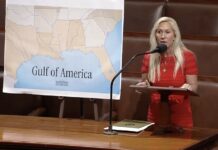
WASHINGTON (GA Recorder) — U.S. Treasury Secretary Janet Yellen warned Monday that the U.S. could default in as soon as one month if Congress does not act to raise the nation’s borrowing limit — a prediction that prompted President Joe Biden to call a meeting with congressional leaders next week.
In a letter to lawmakers, Yellen wrote that after reviewing recent tax receipts, “our best estimate is that we will be unable to continue to satisfy all of the government’s obligations by early June, and potentially as early as June 1, if Congress does not raise or suspend the debt limit before that time.”
The GOP-led U.S. House passed a debt ceiling bill on April 26 by a slim margin, 217-215, to temporarily raise the limit by $1.5 trillion or until March 31, 2024, whichever comes first, and tied the measure to massive discretionary spending cuts and changes in federal programs.
Biden and Democratic Senate Majority Leader Chuck Schumer of New York say the spending cuts are a nonstarter and the debt ceiling must be considered on its own.
The U.S. hit its $31.4 trillion borrowing limit on Jan. 19, triggering the Treasury Department to invoke “extraordinary measures,” or special accounting maneuvers, to continue paying the nation’s bills.
The Treasury will now begin suspending the issuance of State and Local Government Series securities — special securities offered to state and local governments that count against the debt ceiling. The maneuver was also used in the 2014 and 2015 debt ceiling debates as a way to delay the U.S. from reaching its borrowing limit.
“We have learned from past debt limit impasses that waiting until the last minute to suspend or increase the debt limit can cause serious harm to business and consumer confidence, raise short-term borrowing costs for taxpayers, and negatively impact the credit rating of the United States. If Congress fails to increase the debt limit, it would cause severe hardship to American families, harm our global leadership position, and raise questions about our ability to defend our national security interests,” Yellen wrote.
“I respectfully urge Congress to protect the full faith and credit of the United States by acting as soon as possible,” she wrote in closing.
According to the administration, Biden called House Speaker Kevin McCarthy, who is leading lawmakers on a trip in Israel, and Senate Minority Leader Mitch McConnell to invite them to a May 9 meeting at the White House with Schumer and House Minority Leader Hakeem Jeffries.
The Congressional Budget Office, a nonpartisan body that analyzes the cost of legislation, also warned Monday that because the Internal Revenue Service is not hampered by pandemic restrictions, the agency is processing receipts at a faster rate than recent years.
“As a result, we anticipate that the IRS will process relatively few additional payments in May, as it did in the years before the pandemic. That, in combination with less-than-expected receipts through April, means that the Treasury’s extraordinary measures will be exhausted sooner than we previously projected,” CBO Director Phillip Swagel wrote Monday.
The CBO projected that the GOP’s Limit, Save, Grow Act would reduce the federal deficit by a projected $4.8 trillion over the next decade.
The Senate Committee on the Budget will hold a hearing Thursday on the House GOP legislation.
Following Yellen’s warning, Schumer and Jeffries issued a joint statement again criticizing the GOP bill.
“We do not have the luxury of waiting until June 1 to come together, pass a clean bill to avoid a default and prevent catastrophic consequences for our economy and millions of American families. Republicans cannot allow right-wing extremism to hold our nation hostage,” the statement read.
“For generations, Congress has made spending and revenue decisions as part of the annual budget process, which is currently underway. That is the appropriate place to debate and discuss our nation’s fiscal picture — not in a hostage situation in which extreme MAGA Republicans try to impose their radical agenda on America. It’s time to put aside partisan interests and do what is right and necessary for the American people to avoid a first-ever U.S. government default that crashes the stock market, raises costs on families, and jeopardizes retirement savings,” it continued.







